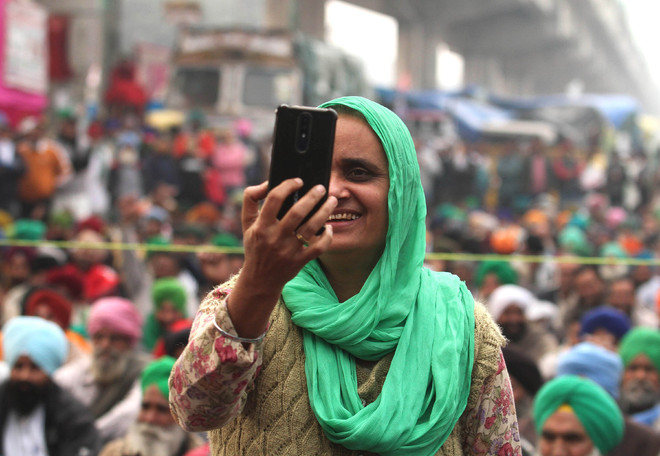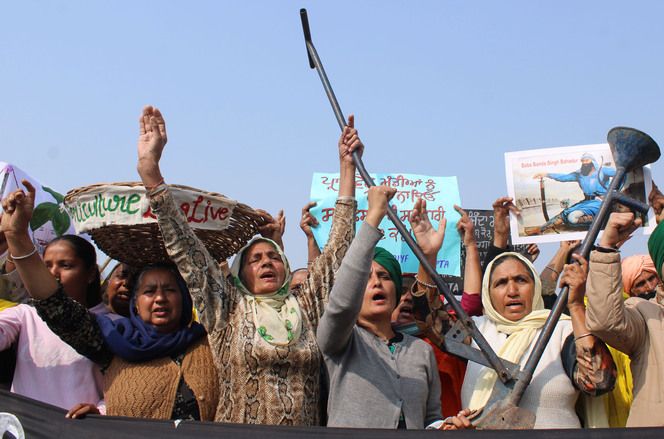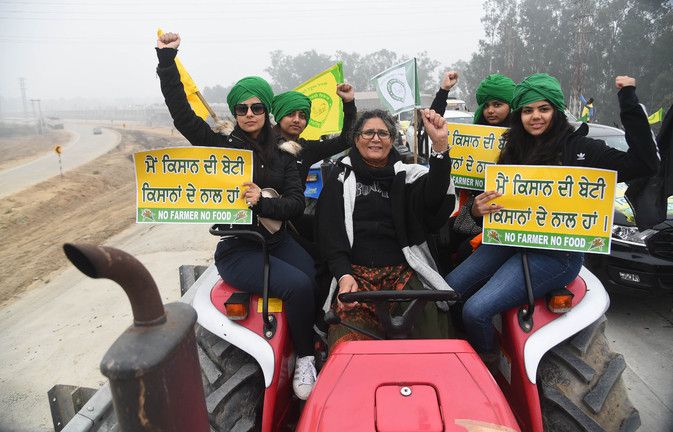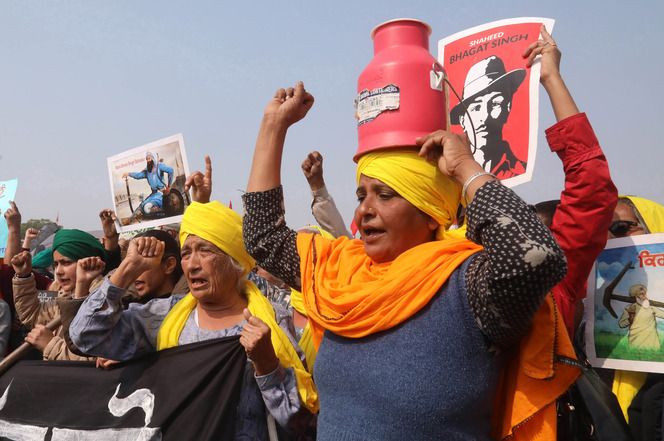
Women’s participation in farmers’ protests is being seen as a life-altering moment. Tribune photo: Mukesh Aggarwal
Geetanjali Gayatri
History is replete with stories of their heroism because valour runs in the Punjabi blood. But, unfortunately, so does patriarchy. And, there is absolutely no dearth of ghastly tales of honour killing, of female foeticide, of subjugation of the fairer sex and worse. These, however, are dark alleys and just not the place to be when the frost in the air gives way and spring is knocking, when the fields are yellow with mustard flowers, when the wheat crop stretches endlessly like a carpet of green and farmers await its shiny golden hues.
This, then, can’t be a season for pessimism. Not in Punjab, most certainly. The farmers have been camping at the Delhi borders against the controversial farm laws right through the three long months of a harsh winter and though no end is yet in sight for their agitation, there is a silver lining to this cloud of struggle. And that comes from the very women who have always lived in the shadows of their men — of fathers and brothers and sons and husbands — and only stepped out when asked to.

“The young girls visiting the borders where the protests are on are realising there is a world beyond the confines of the four walls of their homes, life outside their village and rights they must fight for. This farmers’ agitation has opened new vistas and given them wings to fly. It will be difficult to cage them and deny them this liberty they have tasted when they come back,” believes 38-year-old Sarabjeet Kaur, a panch of Bhadaur village in Barnala district.

Adversity does bring out the best in most women and the sentiment of valour — dominant in the Punjabi lexicon — and qualities of perseverance are gaining new recognition and meaning amid the raging farmer protests at the Singhu and Tikri borders, while the build-up at the Ghazipur border is still gaining momentum.
A country for women, finally!
They are everywhere — leading from the front at the borders where the agitation carries on, holding tractor rallies, participating in meetings, conducting the stage, singing, reciting poems of revolution, cooking, making a splash all around with their presence.
But, that is not all. Back home, in the villages where they have been the behind-the-scenes workforce, they are holding fort while the men are away for the protest — watering the fields, spraying the crop while managing their homes, their traditional role all along.

In Jalandhar, Amritpal Kaur, a mother of two girls and a boy from Bahu Majra village, says this protest has been an eye-opener. “I will make sure both my daughters are financially independent before marrying them off. It was difficult for me to find my feet in the field since the men and hired labour managed everything. Now that we have learnt the ropes, we won’t need to wait for the labour anymore,” she states.
Out of this struggle and this juggling of work have emerged new faces and newer aspirations. Karti Dharti, a fortnightly publication for women at the borders, is chronicling this “stepping out” by the women and getting their feet wet as the agitation spreads. The protest saw a ‘Mahila Kisan Diwas’ celebration to recognise the presence of women and their effort. A labour rights activist, 24-year-old Nodeep Kaur, became the poster girl as voices for her release grew following her arrest at Singhu. She is not alone in this discovery and recognition. Every woman counts. Across barriers of age and caste, religion and section they represent. In this unfolding, they are all one.
In her 20s, Ramdeep Kaur of Algon Kothi, a quaint village in Tarn Taran, has her own story to share. Her village, among a handful of border villages struggling with developmental issues for decades, has most families caught in a grip of debt, landlessness, receding income and a bleak future for their kids.
“Most of the women in our village had never stepped out of their homes on their own and led restricted lives, limited to the house or the farm. The agitation has changed the way we are looked at,” she says. Ramdeep is among the 40-50 women actively participating in the movement and mobilising others.
A new epoch in making
For Ramandeep and her mother Harjinder Kaur, the call to join farmer brothers at Singhu has been life-altering. “My mother is not educated and I have seen her do household chores. I grew up with a similar sense of gender stereotyping. In a community where one had to be veiled while going out or follow what the men in the family decided, coming out of the confines and joining the movement is a big step,” she says.
Her trips to Singhu and Tikri have now made her mother an active participant as well. “I have been there thrice and even delivered a speech last time. I never thought I would be able to do it. I feel I will not have to live a pre-decided life,” vows Ramdeep.
Will the movement bring a change in social standing of women? “It most definitely will. I have never seen women more determined to find their voice,” she avers.
Transitioning from being a passive audience to an active player in leading campaigns and support rallies, women from many a village seem to have found their calling.
“From domestic abuse to unemployment to living debt-ridden lives, there was a deep sense of despair among women. The boiling point came with the pandemic and the farmer movement gave them a chance to channel their anger and take the lead,” says Rupinder Kaur, general secretary, Tarn Taran unit of Punjab Istri Sabha, a wing of the CPI-affiliated National Federation of Indian Women.
In Malanwali village of Gumtala in Amritsar district, at the ripe old age of 80, Avtar Kaur has been sewing flags for kisan jathas for free. She is contributing her bit to the agitation. This new-found usefulness to the cause keeps her going.
Leading the field
Shamsher Singh from Bagli Khurd village near Samrala in Ludhiana district returned from the protest site and was awe-struck seeing how the women in his village were working the fields. “The field role was limited to arranging food for the labour. However, they are now working in the fields independently,” he says.
“My wife and I alternate between home and the protest site. Being at the protest has made me realise that cooking itself is a full-time job and my wife does so much more with the same time,” says Harbans Lal of Fazilka.
In Talwandi Sabo, Rupinder Kaur, who has worked on women’s issues in Punjab, feels the change coming in. “This agitation is a game-changer about how women are perceived. Once back, nobody should expect to see the same timid, quiet women in their homes. Women will no longer be dummy sarpanches and will learn to question everything after having experienced the outside world and tasting liberation. Change is on its way and the first indication is that the men have begun to see their women and their work with respect,” she maintains.
Barnala’s Manveer Rahi, an advocate closely associated with the Lakhowal farmers’ union, is relieved to see women at the borders and leading protests. “This is the change all of us were waiting for. Our girls who come back from protest sites will never be the same again. Once this agitation is over, these women will know no rest. They will take up other issues and forge ahead,” she insists, adamant that the four walls of the houses will no longer hold the spirits ignited by this agitation.
Writing stories of women at the borders in Karti Dharti, Sangeet Toor echoes a similar sentiment. “This agitation has given value to the household chores which, so far, did not count. The arrival of women on the scene of the agitation underlined their discipline and commitment to whatever they were assigned and brought them together with the men in the same political and social space. All these are indications of change that is bound to happen,” she states.
Voices of apprehension
While the picture may seem rosy from afar and things might be moving in the right direction for the women of Punjab through this agitation, for every few votaries of change-is-inevitable, there are the sceptics, though they, too, are keeping their fingers crossed.
Theatre director Kewal Dhaliwal hopes this build-up will not go in vain. He is hopeful it will flow in the blood of the young ones, who will become harbingers of change. “Once the ball has been set rolling, there is no stopping it. How far it goes will depend on how the young carry it and take it forward,” he observes.
“I have mixed feelings to this development. Though I am convinced that political and other organisations will focus on tapping women power to their advantage, I am not too sure if this change will translate into anything significant within the households. The agitation has had a positive impact on the way women are being seen but how long this will last is the big question since patriarchy is deep-rooted in our psyche,” feels Anupama of the Department of Economics, Punjabi University, Patiala. She has been actively associated with surveys related to women.
Hers is not the sole voice of apprehension. “Those looking at this movement as a cultural revolution may just be too optimistic. If you see the songs that came out during the agitation, the women, subjected to taunts in Punjabi songs, were replaced with Delhi but the essence remained unchanged. I can’t say about the men but there is a possibility of a slight change in the thinking of women who have been a part of the agitation. Again, how long this will last is anybody’s guess,” believes Neetu Arora of Punjabi University’s constituent college in Ghudda (Bathinda).
Lending credence to this scepticism is 70-year-old Jasmer Kaur of Sangrur, who has been camping at Tikri. “We never needed to step out from our homes. Once we get what is rightfully ours and the laws are repealed, we will go back to the lives we were living. We did not need to step out all these years. We won’t need to after this,” she quips. Her fellow villagers nod in unison.
The victims of a patriarchal culture are also its carriers, or so it seems, but all revolutions start with baby steps and storms usually begin with a gentle breeze. The farmers’ protests have ignited the fire of hope for change. Now, this around-the-corner brand of hope may well fuel the change.
— With inputs from Aparna Banerji (Jalandhar), Manav Mander (Ludhiana) and Neha Saini (Amritsar)
Join Whatsapp Channel of The Tribune for latest updates.



























